
Informatics in Education
Scope & Guideline
Bridging Technology and Pedagogy for Tomorrow's Educators
Introduction
Aims and Scopes
- Computational Thinking Education:
The journal emphasizes the development and implementation of computational thinking skills across various educational levels, from K-12 to higher education. It explores pedagogical strategies that effectively integrate computational thinking into curricula. - Integration of Technology in Education:
Research focuses on how different technologies, such as gamification, augmented reality, and online learning platforms, can be leveraged to enhance programming education and student engagement. - Assessment and Evaluation in Informatics Education:
The journal discusses methodologies for assessing student learning and performance in informatics education, including formative and summative assessment techniques and learning analytics. - Interdisciplinary Approaches to Computing Education:
It highlights the importance of integrating computing education with other disciplines, promoting interdisciplinary collaboration to enrich the learning experience. - Teacher Training and Professional Development:
Research explores strategies for preparing educators to effectively teach informatics and computational thinking, including professional development programs and curriculum design.
Trending and Emerging
- Data Science and Machine Learning in Education:
There is a growing interest in incorporating data science and machine learning into educational contexts, particularly for K-12 students, reflecting the demand for these competencies in the modern workforce. - Active Learning and Student Engagement:
Research increasingly emphasizes active learning methodologies, such as project-based learning and gamification, to enhance student engagement and improve learning outcomes in programming education. - Equity in Computing Education:
Emerging studies focus on addressing equity in computing education, particularly for underrepresented groups, emphasizing the importance of inclusivity and access to quality informatics education. - Educational Data Mining and Learning Analytics:
The application of data mining techniques to analyze student performance and improve educational practices is a rising theme, indicating a trend towards data-driven decision-making in education. - Interdisciplinary Integration and Collaboration:
There is a notable increase in research exploring interdisciplinary approaches that combine informatics education with other fields, promoting holistic learning experiences and real-world applications.
Declining or Waning
- Traditional Programming Curriculum:
Papers focusing on conventional programming courses without innovative pedagogical approaches have seen a decline. This reflects a shift towards more dynamic and engaging teaching methods that incorporate modern technologies. - Basic Algorithmic Concepts:
Research that solely addresses basic algorithmic concepts without practical applications or interdisciplinary links is becoming less frequent as the field moves towards more integrated and applied educational strategies. - Single-Discipline Focus:
There is a noticeable decrease in studies that focus exclusively on informatics or computer science without considering interdisciplinary or cross-curricular approaches, suggesting a shift towards a more holistic educational framework. - Static Assessment Methods:
Papers that discuss traditional assessment methods, such as standardized testing in programming, are less prevalent, indicating a preference for more formative and innovative assessment strategies that align with contemporary educational practices.
Similar Journals
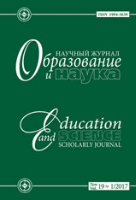
Obrazovanie i Nauka-Education and Science
Exploring Innovations in Learning and TherapyObrazovanie i Nauka - Education and Science is a distinguished open-access journal published by the Russian State Vocational Pedagogical University, dedicated to advancing knowledge in the fields of education, developmental and educational psychology, and physical therapy. With ISSN 1994-5639 and E-ISSN 2310-5828, the journal has established itself as a pivotal source of research and scholarly discourse in Russia since adopting an open-access model in 2012, allowing unrestricted access to its content for scholars and practitioners alike. The journal's significant impact is mirrored in its recent category quartiles, ranking in Q3 for both Education and Physical Therapy as of 2023, affirming its relevance to modern educational practices and rehabilitation sciences. Furthermore, its respectable Scopus ranking indicates a solid position within the competitive realms of social sciences and health professions. With a commitment to quality and accessibility, Obrazovanie i Nauka serves as an invaluable resource for researchers, educators, and students aiming to deepen their understanding and improve practices within these vital sectors.
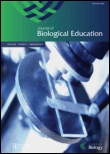
JOURNAL OF BIOLOGICAL EDUCATION
Inspiring the Future of Biological EducationThe JOURNAL OF BIOLOGICAL EDUCATION is a prominent academic journal published by Routledge Journals, Taylor & Francis Ltd, focusing on innovative research and practices in the field of biological education. With an ISSN of 0021-9266 and E-ISSN 2157-6009, this journal serves as a vital resource for educators, researchers, and students dedicated to enhancing the teaching and learning of biology. Since its inception in 1967, it has maintained a consistent commitment to promoting best practices and integrating new methodologies into biological curriculum design and pedagogy. The journal holds a respectable impact factor and ranks in the Q2 category for both Agricultural and Biological Sciences and Education, reflecting its influence and authority within these fields. Researchers are encouraged to engage with its diverse range of articles that address critical issues in biological education, showcasing cutting-edge research and practical approaches. Its reach is particularly significant in the United Kingdom and globally, making it a key platform for disseminating knowledge and fostering collaboration among professionals.
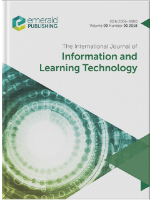
International Journal of Information and Learning Technology
Transforming Education with Insightful Technology StudiesInternational Journal of Information and Learning Technology is a pivotal publication in the fields of computer science and education, published by the esteemed Emerald Group Publishing Ltd. With an ISSN of 2056-4880, this journal has positioned itself as a valuable resource, reflecting a commitment to high-quality research and discourse in information technology and learning methodologies. Recognized for its significant contributions, it holds a respectable Q2 ranking in both Computer Networks and Communications and Computer Science Applications, along with a prestigious Q1 ranking in Education for the year 2023. The journal spans an expansive converged period from 2015 to 2024, providing an extensive archive of innovative ideas and findings that are instrumental to researchers, educators, and IT professionals alike. Although currently not open access, the publication remains vital to the academic community, ensuring that cutting-edge research and discussions continue to inform and inspire advancements in the integration of technology within learning environments. From its base in Leeds, United Kingdom, the journal invites submissions that explore the nexus of technology and education, fostering a deeper understanding of how digital innovations can enhance teaching and learning experiences.

Revista Educaonline
Navigating the Future of Online Learning TogetherRevista Educaonline is a premier academic journal published by the Federal University of Rio de Janeiro's School of Communication, dedicated to advancing the field of online education and digital communication technologies. With the ISSN 1983-2664, this journal serves as an essential resource for researchers, educators, and practitioners exploring innovative methodologies and pedagogical frameworks in the digital landscape. Although the journal currently does not offer Open Access, it maintains a rigorous selection process to ensure the publication of high-quality research pertinent to contemporary educational practices. The editorial board is committed to promoting interdisciplinary discourse that bridges technology and education, fostering advancements that respond to the evolving needs of learners worldwide. As scholars strive to navigate the complexities of digital learning, Revista Educaonline stands out as a vital platform for disseminating impactful research, ultimately enriching the academic community's understanding of online education dynamics.
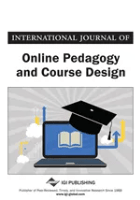
International Journal of Online Pedagogy and Course Design
Transforming online learning experiences.The International Journal of Online Pedagogy and Course Design, published by IGI Global, serves as a vital resource for researchers, educators, and practitioners interested in the integration of technology in education. Since its inception in 2017, this journal has focused on the latest advancements in online teaching methodologies, course design, and assessment frameworks, contributing to the dynamic field of educational technology. It is indexed in Scopus and currently ranks Q4 in the Education category, reflecting its growing influence within the academic community. The journal provides an invaluable platform for sharing innovative research and practical insights that enhance online learning experiences, crucial in today’s digitally-driven educational landscape. With an ISSN of 2155-6873 and E-ISSN of 2155-6881, the journal is dedicated to fostering a collaborative environment where ideas and practices in online pedagogy can thrive.
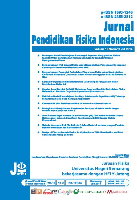
Jurnal Pendidikan Fisika Indonesia-Indonesian Journal of Physics Education
Shaping the Future of Physics Learning GloballyJurnal Pendidikan Fisika Indonesia-Indonesian Journal of Physics Education is a premier open-access journal dedicated to advancing research and pedagogy in the field of physics education. Published by Universitas Negeri Semarang, this journal aims to provide a platform for educators, researchers, and professionals to disseminate innovative teaching practices, empirical studies, and theoretical insights that contribute to the enhancement of physics education globally. With a commitment to accessibility since its inception in 2009, the journal is instrumental in fostering collaboration and knowledge sharing across the international physics education community. The journal not only serves as a vital resource for scholars and practitioners but also plays a significant role in shaping the future of physics teaching and learning in Indonesia and beyond. Researchers and educators are encouraged to submit their manuscripts to engage with the latest trends and research in this dynamic field.

Journal of Science Education and Technology
Integrating Innovation in Science Education.The Journal of Science Education and Technology, published by SPRINGER, stands as a premier platform in the fields of education and engineering, recognized with a prestigious Q1 ranking in both categories as of 2023. With an ISSN of 1059-0145 and an E-ISSN of 1573-1839, this journal serves as a pivotal resource for researchers, educators, and practitioners alike, emphasizing the integration of scientific inquiry and technological advancements in educational contexts. Since its inception in 1992, the journal has consistently provided high-quality, peer-reviewed research that shapes contemporary practices and methodologies in science education. With its notable Scopus rankings, including a 95th percentile in Social Sciences Education, the journal is essential for anyone eager to enhance their understanding of effective teaching in STEM fields. While the journal is not open access, its contributions are invaluable to advancing knowledge and innovations that are crucial for the progressive education landscape, making it a must-read for scholars and students committed to excellence in science education.

Medical Science Educator
Innovating education to empower future healthcare leaders.Medical Science Educator, published by SpringerNature, is an esteemed journal committed to advancing the intersection of educational methodologies and medical science. With a significant impact in its field, this journal holds a Q2 ranking in both Education and Medicine (miscellaneous) categories as of 2023, reflecting its dedication to high-quality research and scholarly dialogue. Operating in a digital format, the journal uniquely facilitates access to pivotal studies from its inception in 2011 until 2024, fostering innovation in medical education. The latest rankings highlight its credibility, placing it at the 63rd percentile in Social Sciences - Education and the 56th percentile in Medicine - Medicine (miscellaneous) within Scopus. This platform serves as an invaluable resource for educators, researchers, and practitioners aiming to enhance teaching practices and shape the future of medical education.

Ensayos-Revista de la Facultad de Educacion de Albacete
Championing accessible research for transformative education.Ensayos-Revista de la Facultad de Educacion de Albacete is a distinguished open-access journal dedicated to the field of education, published by UNIV CASTILLA-LA MANCHA, ESCUELA MAGISTERIO ALBACETE. Since its inception in 2011, the journal has provided a platform for high-quality research and innovative pedagogical practices, fostering academic discourse and collaboration among educators, researchers, and practitioners in the education sector. With an ISSN of 0214-4824 and E-ISSN 2171-9098, it is committed to disseminating knowledge that enhances educational outcomes and promotes effective teaching methodologies. The journal is located in Albacete, Spain, and emphasizes the importance of educational research in shaping contemporary educational frameworks. By ensuring open access to its content, Ensayos makes its research widely available, allowing for greater impact and engagement within the academic community. This commitment to accessibility positions the journal as a valuable resource for anyone invested in the advancement of education.

International Journal for Technology in Mathematics Education
Exploring the synergy of technology and mathematics learning.International Journal for Technology in Mathematics Education (ISSN: 1744-2710, E-ISSN: 2045-2519) is a pioneering platform published by Research Information Ltd that focuses on the interplay between technology and mathematics education. Established to bridge the gap between pedagogical practices and technological advancements, this journal connects researchers, educators, and practitioners in a bid to enhance teaching methodologies and optimize learning outcomes in mathematics. Although its coverage in Scopus was discontinued after 2020, it continues to be a vital resource for those interested in the integration of technology into educational settings. With its significant emphasis on interdisciplinary approaches, the journal has garnered attention in the realms of social sciences and computer science, with Scopus rankings reflecting its niche contributions. This journal is crucial for professionals aiming to explore innovative techniques in mathematics education, making it an invaluable addition to any academic library.